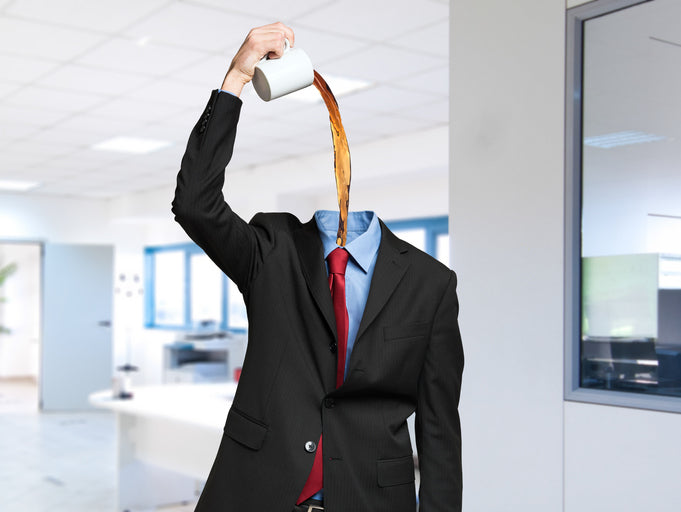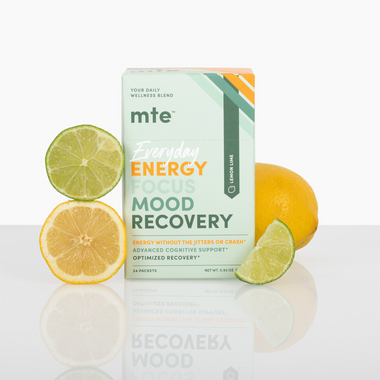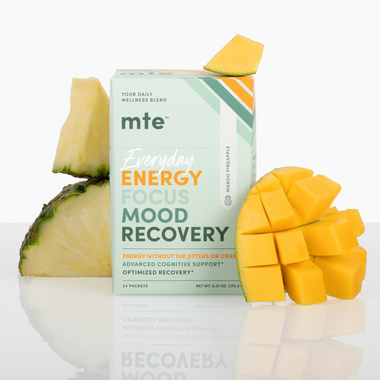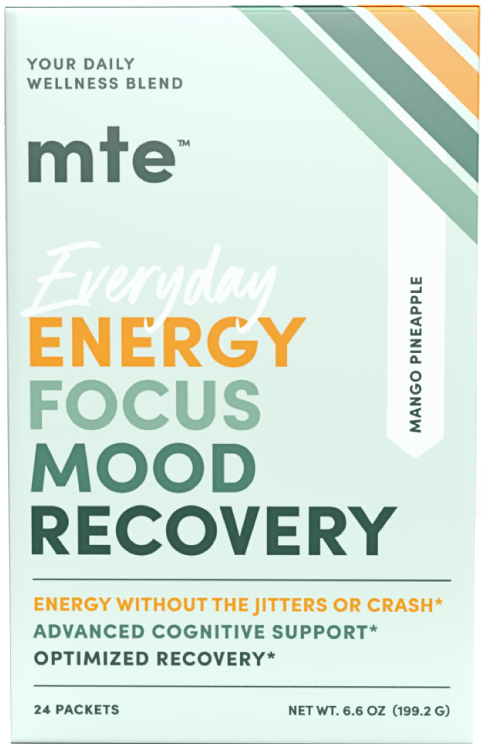
The Perils of Excessive Caffeine Use: How Much Caffeine Is Too Much?
Caffeine is a natural stimulant found in various plants, including coffee beans, tea leaves, cocoa beans, and kola nuts. People have been consuming caffeinated drinks for several thousand years for everything from energy to stamina to immunity. Why? It works, and it’s everywhere. Nowadays, even moreso — you’re always within arm’s reach of a caffeinated drink, whether tea, coffee, energy drinks, pre-workouts, supplements for energy and focus — we could go on, but you get the point.
Many parts of the world rely on caffeine to get us going in the morning and keep us sharp throughout the day; we’re busy — we need it. But how much caffeine, if any, is healthy? Are we helping ourselves in the short-term just to sell our own health down the river in the long-term?
Let’s look at the stats on caffeine, dangers of consuming too much, what to do if you experience side effects, how to reduce your caffeine intake and still have energy throughout the day, and how to find the best morning coffee alternative. Sound like enough stuff to cover?
Great — let’s go.
The Stats on the Current State of Caffeine Use
If you were wondering whether we’re hyping up the level of reliance we have on caffeine, let us introduce you to a website that exists solely to quantify those things: The Caffeine Informer. Their research says 69% of the US population consumes caffeine every day. Globally, 200–400 METRIC TONS are consumed globally. Most of it is coffee, but for the younger demographics, energy drinks take a central role as well.
While the FDA’s upper limit for daily caffeine intake is 400mg, the top 10% of caffeine consumers drink an average of 520mg per day! And the age demographics that consume the most? You guessed it — Millennials and Gen X. Because everything is fine and we are fine… she writes as she reaches for her fourth cup of coffee at 2pm, wondering why she never gets a good night’s sleep.
Okay, so we’re in love with caffeine; one could say we’re addicted (because we are). What’s the big deal? Why should we care?
(Hint: The foreshadow was in the FDA's safety limits.)
How Does Caffeine Work?
Caffeine is a central nervous system agonist, which means that it increases the activity of certain neurotransmitters in the brain. Specifically, it signals a false stress response, triggering your central and sympathetic nervous systems to sit up, pay attention, and get ready to run. It’s the reason you can really feel that caffeine “kick” — it is biologically kicking you into gear.
The other side of the wake-up-and-get-going feeling caffeine provides is that it antagonizes other neurotransmitters; it specifically suppresses calm-down and I’m-tired signalers. Sounds effective, right? And it is. But it’s not functional.
You know how in fairy tales there’s always an opportunity that’s too good to be true, but there’s a price that makes the payout worthless? Ariel trades her voice for legs to win over a prince — desperate. In the original story, she gets friend-zoned and dissolves into seafoam. RIP. Or Bluebeard’s wife, who marries a serial killer for wealth — also RIP.
Our kids really need better role models…
Likewise, caffeine gives you what it promises pretty much right away — you feel productive and energized. But do you really, though? Or are irritability and jitters already a tradeoff? And when the caffeine spell wears off? A fatigue crash so bad you, too, would like to dissolve into seafoam. Wearing yourself down with this pattern for years can hurt your heart, health, and even your sense of self.
How Much Caffeine is Too Much?
According to the US Food and Drug Administration (FDA), the European Food Safety Agency (EFSA), and Health Canada, consuming up to 400mg of caffeine per day is safe for healthy adults. That’s four cups of coffee or shots of espresso, or 1–2 energy drinks. However, you have to remember that different foods contain different amounts of caffeine, and everything counts towards your daily intake. That includes things like chocolates, sodas, and supplements.
Going over 400mg per day (or even smaller amounts for people sensitive to caffeine) could lead to jitters, elevated heart rate, feeling overwhelmed, and other negative sensations. People who experience them frequently should cut back on caffeine or seek a substitute for tea and coffee. Believe it or not, you can OD on caffeine, which carries real and dangerous threats to your cardiovascular system.
Although 400mg per day is safe for most healthy adults, the amount of caffeine that is considered “too much” varies from person to person. Some people are more sensitive to its effects because of factors like age, body weight, health status, and frequency of use. Check out this fun calculator that’s literally called Death by Caffeine!
Genetics also plays a significant role. For example, variations in the CYP1A2 gene determine how quickly our bodies metabolize caffeine, which regulates how long caffeine stays in our bodies and how long we feel its effects. People who are pregnant and/or breastfeeding, and children should limit caffeine intake, if they use it at all. Consider additional factors like metabolic disorders and mental health difficulties with mood and overstimulation, and it’s easy to see why you should always look a gift horse in the mouth.
What Are the Side Effects of Consuming Too Much Caffeine?
Most people are well aware of the consequences of consuming more caffeine than they can tolerate. The most common complaint is the crash people experience a few hours after drinking coffee. It happens because when the caffeine wears off and isn't blocking those I'm-tired receptors anymore, those signalers come flooding to their receptors, making you feel like one of those bodies piled in Bluebeard's murder room.
Other not-so-great consequences of too much caffeine can include:
- Jitters
- Distress/reactivity
- Increased heart rate
- Nervousness
- Poor recovery
- Headaches
- Digestive problems
- Nausea
- Frequent urination
- A general feeling of unhappiness
- Muscle tremors
Long-term overexposure to stress response hormones and suppression of the parasympathetic nervous system (the one that helps you calm down) can lead to long-term problems, too:
- Restlessness (even panic attacks!)
- Increased risk of heart problems and high blood pressure
- Sleeplessness (even actual insomnia!)
- Alteration of the brain’s stress response system (actual brain damage!)
- Reduced immunity and worsening of chronic conditions
- Tolerance, dependence, and withdrawal… caffeine is a drug, after all
So, funnily enough, the short-term gains already come with short-term pains; you don’t even have to wait for the long-term stuff to regret that 2pm coffee — I’ll regret it later today, and definitely later tonight. Let’s look at why and then talk about how to transition to a healthy caffeine alternative: a feel-good drink without the jitters, crash, or addiction.
Why Does Too Much Caffeine Cause Jitters & Overthinking?
We use caffeine as a pro-focus productivity drink because it motivates us and helps us zone in. But how does it do that? By telling your brain to panic. Caffeine recruits the sympathetic nervous system to trigger the release of hormones that manage stress response. Think of it as a false fight-or-flight. As a result, too much caffeine can overstimulate the brain, causing stress, nervousness, jitters, or shaking.
In addition, this false stress response causes a short-term rise in blood pressure and heart rate. Raised blood pressure, adrenal stress, and chronic heightened pro-stress chemicals over time wear down… well, everything about you. It’s like running a motor at its highest capacity forever — it’ll break, probably at a crucial moment.
Let’s note, though, that chronic overconsumption is the real issue, as moderate intake of caffeine is generally fine — otherwise it wouldn’t have kept such an important place in past and present societies.
How Does Caffeine Affect Your Sleep/Wake Cycle?
Many people fall into a vicious cycle of trying to compensate for lack of adequate nightly rest with caffeinated beverages because we’re overworked and under stress. But nootropic energy from caffeine doesn’t work like other (better) nootropic drinks; even though you’re fully crashed around 6pm from that 2pm coffee, the subtle effects persist way past that, which is why you’re restless when you go to bed even though you are so. exhausted. You don’t sleep well. So the next day you need more caffeine. Rinse. Repeat. Regret.
One study examining caffeine’s effect on sleep revealed that consuming caffeine three or six hours before bedtime considerably disrupts sleep. In fact, the results showed that consuming 400mg of caffeine six hours before bedtime reduced total sleep time by one hour. When you’re only working with 8 hours tops, losing even one results in chronic sleep debt, which comes with its own host of horrible consequences .
Does Caffeine Exacerbate Digestive Problems like IBS?
For many people, that morning cup of coffee is what triggers the metabolism to get going. That’s because coffee has a laxative effect that triggers the release of gastrin. This hormone plays a central role in digestion, so small or moderate amounts of coffee can improve bowel movement.
However, too much caffeine could overstimulate the stomach, small intestine, and colon, leading to gas problems, diarrhea, loose stools, heartburn, and nausea. Even with a single caffeinated energy drink, if you’re someone who regularly skips breakfast, as many of us do, you’re much more likely to have an upset stomach — which only exacerbates feelings like jitters and stress. It’s clear we need an IBS coffee alternative that can provide focus and energy without the side effects we’ve talked about.
Tips for Safe Caffeine Consumption
Avoiding side effects like jitters, clammy hands and nervousness requires following some tips for safe caffeine consumption. Here are the most important things:
- Know Your Limits.
Although the general recommendation states that people shouldn’t consume more than 400mg per day, some people are more sensitive to caffeine than others. As a result, they may experience side effects at lower doses. That’s why it is vital to understand your limits and cut back on caffeinated beverages and foods if you experience negative effects.
- Read Labels.
People should be aware of the amount of caffeine coming from different sources. That includes coffee, tea, sodas, energy drinks, chocolate, medications, caffeine supplements, and other foods and products. Reading the labels could help you understand how much caffeine you consume each day. If the number is too high, consider cutting back.
- Don’t Consume Caffeine Late in the Day.
Caffeine can interfere with your circadian rhythm, making people feel even more tired the next day. As a result, they may seek more caffeine, which puts them in an endless cycle of poor sleep and exhaustion. If you want to avoid this, try not to consume caffeine too close to bedtime.
- Talk to a Healthcare Provider
People who are pregnant/breastfeeding, people with chronic conditions, and people taking certain medications often need to limit their caffeine intake. That’s why it’s a good idea to talk to a healthcare provider and learn more about how caffeine interacts with different medications and conditions.
- If You Want to Quit Caffeine, Do It Gradually
Quitting caffeine cold turkey can result in withdrawal symptoms like overwhelming awareness, distress, nausea, and headaches. The best way to prevent these side effects is to lower caffeine intake gradually. People usually do that by choosing decaf options for coffee and avoiding sodas, foods, and other beverages containing caffeine.
While you’re at it, find some alternatives to coffee and caffeine that will do more than speed you up for a bit and leave you crashing. Nature’s got some other things to offer:
How to Stay Awake Without Coffee: What Are Healthy Caffeine Alternatives?
Okay, so we need something that can boost energy naturally now, but doesn’t hurt us later and doesn’t harm our long-term health. At the same time, some of us are dependent on caffeine, so we can’t exactly go cold turkey and still pretend we’re functional and productive. Withdrawal is real, and weaning off caffeine is better done gradually via healthy habits and a bit of help from the nicer side of nature.
A caffeine-free nootropic drink stacked with an adaptogenic herb blend can do all those things and more. And this isn’t one of those too-good-to-be-true, regret-it-later situations; it’s a series of advancements in health science, coupled with several years of obsessive research and development. When caffeine is digested, a compound called paraxanthine is produced. For the longest time, we could only observe paraxanthine in lab settings, but it’s recently been synthesized, which allowed us to use it in MTE’s formula for a caffeine-free alternative for energy and wellness.
Paraxanthine vs coffee isn’t even a competition, because paraxanthine boosts focus, energy, mood, and metabolism just as well as caffeine, but the list of paraxanthine side effects is so short that for most people it’s non-existent. That’s because paraxanthine’s energy boost is a result of deftly modulating neurochemical signaling instead of caffeine’s forcing some and jamming others. It also doesn’t use a false stress response to boost mood and performance; it promotes pro-motivation and reward signaling instead of pro-stress and fear signaling.
MTE (More Than Energy) is a first-of-its-kind daily wellness supplement powder that combines nootropics like paraxanthine with adaptogens and superfoods to achieve a sustainable, jitter-free energy boost. In the short-term, there’s no crash, no sleep disturbance, no hard feelings. In the long-term, there’s no wearing down of your stress response system, your heart, or your ability to feel good and have fun.
Natural ingredients with centuries of use behind them, like ashwagandha, spirulina, and maca all support paraxanthine’s sustainable energy without the complications of excessive caffeine. Saffron supports mood, theanine promotes calm clarity, and chicory root supports gut health. Most importantly, this anti-procrastination drink doesn’t leave you nervous, jittery, and crashing after a few hours. Interested in what makes MTE so special? Learn more about our unique formulation and how we’ve made a stress relief drink, wellness supplement, caffeine-free energy drink into one master supplement for real vitality in the present and the future.






